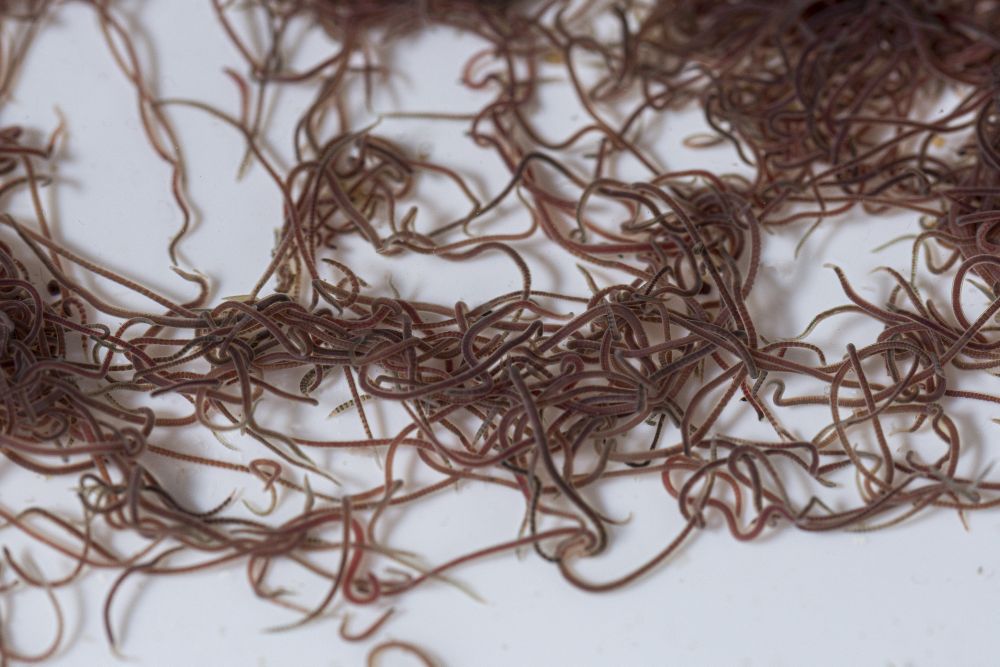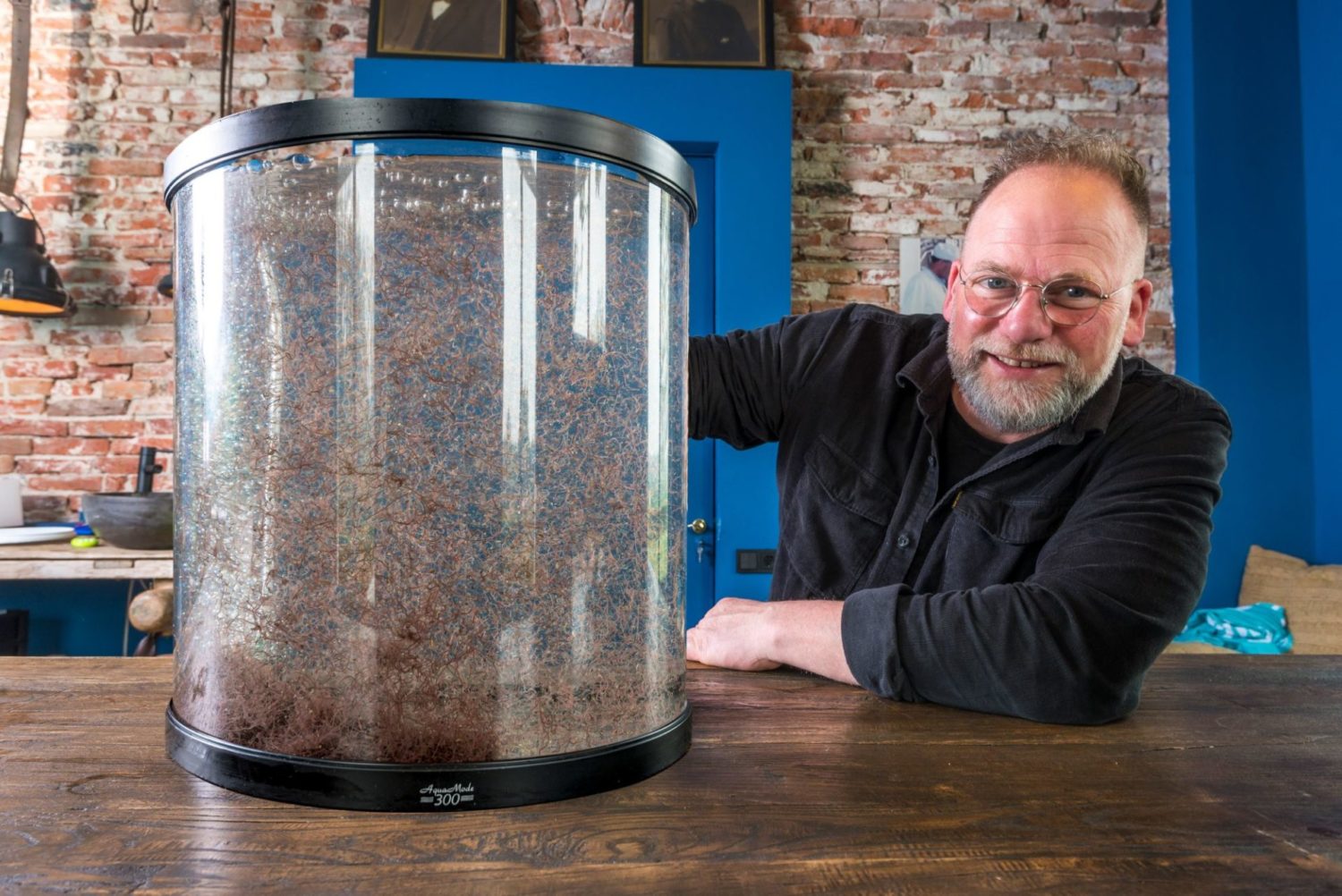
Jean Mekelenkamp is studious, a born pioneer and afflicted with an irrepressible love of worms. In 2017, he founded the company Lumbriculus in Oostwold, a worm farm with which he has made considerable strides in recent times.
Yes, Jean Mekelenkamp would recommend the Business Innovation Food Program (BIPF) to any entrepreneur in the food sector. At least, if you want to contribute to the food transition with your idea. In any case, it has brought a lot to the worm breeder himself, he says. "The program has given me a better understanding of the real needs of potential customers. It has taught me to focus. Since going through the BIPF, my main focus with Lumbriculus has been growing aquatic worms for large fish farms.'
Brabant
For more than 35 years Jean has been moving in the world of worms. First in paid employment when he put together feed for worm farmers for a company. Later, in 1997, he and his brother started their own worm farm in Almkerk, Brabant, followed by setting up two more companies. The worms were used by the horticultural industry, among others, to restore and improve the soil.
In 2017, he decided to sell his shares. Two years before, Jean and his family had settled down in Oostwold from Brabant to start a worm farm there as well. 'I wanted to do something different,' he says. 'To occupy myself in a new environment with the cultivation of different types of worms than I was doing in Almkerk. It eventually became the aquatic worm species Lumbriculus Variegatus , a freshwater worm, also called blackworm.'
Archive
In his study in a stately manor house on the Goldhorn, on the outskirts of the village, Jean opens a cabinet. He displays a large number of binders neatly sorted and classified in a row. The folders contain scientific articles and other information he has collected about worms over the past few decades. 'I have no training in that field,' Jean emphasizes. 'All my knowledge about worms I gathered through self-study. Combined with practical experience, of course.'
Cold-blooded
One of the articles in the archive concerns a 1907 study conducted by the University of Prague. 'In it, it was scientifically demonstrated that blackworms differ from other freshwater worms in almost everything,' Jean explains. 'The worm can swim on its own and multiplies at lightning speed by dividing itself. Most worms die when they split in half. Not the blackworm, which grows a head and tail again. Moreover, it is a cold-blooded worm that eats almost anything, but does not need food to stay warm. As far as I know, there is no other animal that reproduces so efficiently. For a breeder, of course, this is of great importance.'
Many studies of the blackworm have now been conducted worldwide, with interesting results each time. For Jean at the time, reason to go full throttle for breeding the worms. There was no lack of confidence. 'Also in Almkerk we started with nothing at all,' he says. 'We had rented a small building, with some cultivation in wooden boxes. A thriving business grew out of that. So if you really want to, a lot is possible. A matter of developing first and then just keep repeating. Just until you have fully understood the process and all the teething problems have been ironed out. That is what I am doing with Lumbriculus now.'

Closed and controlled
About the breeding process of the blackworms, Jean wants to say little. That is still a secret, simply because he has not yet patented it. He does say that it is a closed and controlled system and that the worms are fed grains. 'Blackworms can be used for different purposes,' Jean explains. 'As food for ornamental and consumer fish, for example. But I am also convinced that they are suitable for human consumption. The worms are packed with protein and contain many unsaturated fatty acids. Not unimportant, especially now that another way of consuming and producing is inevitable. You only need 0.7 kilograms of feed to produce 1 kilogram of meat. Moreover, it is a process that is very controllable. It is circulating water that you can just hang a meter in, so everyone can watch, so to speak. It just might become the food of the future.'
Important milestone
A contribution from the LEADER East Groningen grant program enabled Jean to invest in resources to scale up the growing process and expand production capacity. An equally important milestone was participation in Business Innovation Food Program. 'Last January I was alerted to the existence of the program by Riegiena Eefsting, business developer AgriFood at the NOM,' he says. 'It seemed like a good idea to me. I had been on an island by myself for a long time, I thought. I wanted to share my story with other entrepreneurs who want to help shape the food transition. At the same time, I hoped to learn something from it.'
Reproductive phase
A primary goal of the BIPF is to create a sound business case. This means that participants learn to look critically at their business and must investigate who and where their customers are. But also: with which revenue model they can best storm the market. In all, Met Jean spoke with 23 companies, mostly large fish farms. 'They were surprisingly open conversations,' he looks back.' 'I soon found out that fish farmers were diligently looking for live feed for consumer fish such as salmon, tuna and sturgeon. Especially for fish in the reproductive phase. I was aware of that, but didn't know the problem was so big. That insight helped me enormously in making sharp choices. I was just too broadly oriented until then."
Trial deliveries
Indeed, the blackworms of Lumbriculus might be the ideal food during the reproductive phase. After all, they contain the necessary protein and fats to give the fish more resistance. The food they had been given so far did not appear to be sufficient for this purpose. 'At the same time it became clear that many young fish die in the phase from birth to the 15th day,' says Jean. 'They then do not take in the right food or even no food at all. The fish farmers are trying to grow all kinds of live foods themselves. From algae to copepods. Without the desired results. In that case, too, the blackworms can offer a solution.'
And so Lumbriculus' main focus is now on breeding feed for consumer fish. Meanwhile, since participating in the BIPF, the company has already made several trial deliveries towards renowned fish farms. 'The reactions are extremely positive, but the farms obviously demand continuity,' Jean emphasizes. 'Fresh every week and never selling no. Currently, I still have a small farm with a limited number of compartments. So I need to scale up to become more robust. I'm in talks with investors about that. That too looks promising.'


